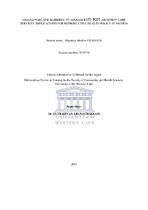Challenges and barriers to adolescents' post-abortion care services: Implications for reproductive health policy in Nigeria
Abstract
The prevention of abortion related complications and mortality is dependent on the availability,
accessibility and usability of emergency post-abortion care (PAC) throughout the health care
system. Unfortunately, abortion is not legal in Nigeria and Nigerian women, especially
adolescents, are often unable to obtain adequate post-abortion care services due to a variety of
reasons. A review of literature shows that adolescent PAC patients receive worse care than older
women seeking PAC services. There is widespread recognition of the need to overcome these
barriers and make it easier for women to obtain the PAC services they need. Therefore, overall
aim of this research study was to provide empirical information on the barriers and challenges to
adolescents' PAC and develop a policy document to inform reproductive health services for
Nigerian hospitals. To develop this policy document, the study specifically sought to assess
knowledge of reproductive-health and related post-abortion care services among health care
providers; describe the adolescents' perception of post-abortion care received; determine the
service providers' perspectives on adolescents' post-abortion care challenges and barriers; analyze
the challenges and barriers faced by adolescents in obtaining post-abortion care services; explore
ways in which the knowledge about challenges and barriers to adolescents' post-abortion care can
be used to inform policy; develop policy document and make recommendations in key areas to
improved PAC services in Nigeria as part of working towards improving reproductive health
services.

